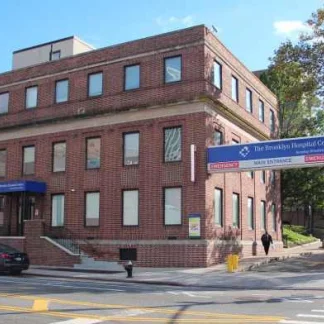Roberto Clemento Family Guidance Center
Roberto Clemento Family Guidance Center is a public rehab located in New York Ci...
Brooklyn Hospital Center (BHC) Parkside Dependency Treatment Program provides an addiction treatment center in Brooklyn, NY. Since 1845, the Brooklyn Hospital Center has provided comprehensive health services, education, and research to their community.
Specializing in chemical dependency treatment, Brooklyn Hospital Center offers a wide range of treatment programs and services including: Medically Managed Detoxification The Brooklyn Hospital offers medically managed detoxification. Under the supervision of experienced medical professionals, patients undergo a systematic withdrawal process, ensuring minimal discomfort. Discharge Planning The team at The Brooklyn Hospital Center places a strong emphasis on discharge planning, preparing patients for this transition, and ensuring they have the necessary resources and support to maintain their recovery journey. Alcohol/Drug/HIV Prevention Education Education serves as a cornerstone of effective recovery. The unit offers a comprehensive alcohol, drug, and HIV prevention education program. Through this, patients gain invaluable knowledge about the risks associated with substance abuse and the importance of prevention. Individual and Group Counseling BHC also provides both individual and group counseling sessions. Led by experienced therapists, these sessions aim to address the emotional and psychological aspects of addiction, offering patients a platform to share, learn, and heal.
Contact us for more information: (718) 250-8900

Connect with Brooklyn Hospital Center Parkside Dependency Treatment Program by calling their admissions team directly.
(718) 250-8900 Website Get DirectionsState Licenses are permits issued by government agencies that allow rehab organizations to conduct business legally within a certain geographical area. Typically, the kind of program a rehab facility offers, along with its physical location, determines which licenses are required to operate legally.
State License: New York
Group therapy is any therapeutic work that happens in a group (not one-on-one). There are a number of different group therapy modalities, including support groups, experiential therapy, psycho-education, and more. Group therapy involves treatment as well as processing interaction between group members.
In individual therapy, a patient meets one-on-one with a trained psychologist or counselor. Therapy is a pivotal part of effective substance abuse treatment, as it often covers root causes of addiction, including challenges faced by the patient in their social, family, and work/school life.
Nutrition therapy, aka medical nutrition therapy (MNT), is a way of treating physical, emotional, and medical conditions through diet. Specific dietary plans are designed by professional nutritionists or registered dietitians, and patients follow them in order to positively affect their physical and mental health.
In individual therapy, a patient meets one-on-one with a trained psychologist or counselor. Therapy is a pivotal part of effective substance abuse treatment, as it often covers root causes of addiction, including challenges faced by the patient in their social, family, and work/school life.
Nutrition therapy, aka medical nutrition therapy (MNT), is a way of treating physical, emotional, and medical conditions through diet. Specific dietary plans are designed by professional nutritionists or registered dietitians, and patients follow them in order to positively affect their physical and mental health.
Nutrition therapy, aka medical nutrition therapy (MNT), is a way of treating physical, emotional, and medical conditions through diet. Specific dietary plans are designed by professional nutritionists or registered dietitians, and patients follow them in order to positively affect their physical and mental health.
Roberto Clemento Family Guidance Center is a public rehab located in New York Ci...
Restorative Management Corporation is an inpatient rehab located in Brooklyn, NY...
Khaleidoscope Healthcare is a private rehab located in Jersey City, New Jersey. ...
Housing Plus Solutions is a private rehab located in Brooklyn, New York. Housing...